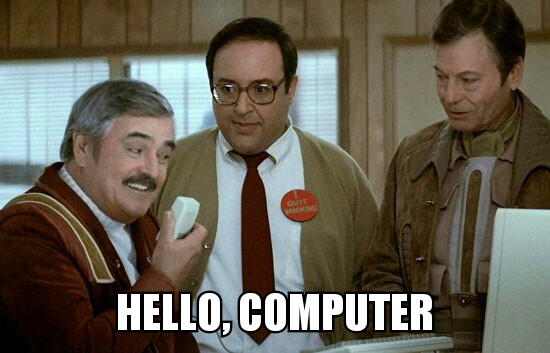
PRODUCTHEAD: “Hello computer!” — the lure of conversational programming
PRODUCTHEAD is a regular newsletter of product management goodness,
curated by Jock Busuttil.
if you say the product #
every PRODUCTHEAD edition is online for you to refer back to
tl;dr
Conversational programming changes the nature of the developer job, but doesn’t do away with it
Describing needs and context is more valuable than giving instructions or requirements
hello
The sci-fi trope of talking to computers has been around for so long, even Star Trek (which helped to popularise the concept) was skewering it in the late 1980s:

So if you want to be a really good futurologist, simply watch some sci-fi and wait 20 or 30 years for the kids watching it to grow up, get their PhD and make a career-defining breakthrough.
Hey Google, can you fake a video for me? #
We seem to be seeing these kinds of breakthroughs with perplexing regularity at the moment, partly because of the breathless hype and near-constant tech coverage of generative AI and large language models. This week was Google’s turn to steal the spotlight — although not in the way it intended. It released an impressive video of its new multi-modal Gemini AI seemingly reacting in real-time to what the demonstrator was drawing and saying. Rather the video could be better described as ‘fake it ‘til you make it’.
As reported by Parmy Olson for Bloomberg and Benj Edwards for Ars Technica, the amount of computing power that would be needed to work as shown is currently impractical. A Google spokesperson admitted to Olson that the AI responses were captured individually using regular text prompts, which were then edited together with a new voiceover reading the original prompts used.
It’s a shame that Google is trying so hard to show that they can compete with OpenAI in this way. These ham-fisted attempts to regain control of the narrative are only taking away the focus from their actual AI-related breakthroughs, such as how researchers recently used Google DeepMind to find a set of novel materials 45 times larger than the total previously identified in the history of science.
The lure of conversational programming #
Conversational programming is the realisation of what all those sci-fi shows anticipated so long ago. You talk to the computer, it understands your intent, then attempts to fulfil your request by creating and executing code on your behalf. It won’t be long* before your developers, like Scotty before them, will find keyboards to be a quaint relic of a bygone age.
* Yes it will
But let’s back up a little. The main reason code exists is to make it easier for people to give a computer instructions it will be able to interpret and act upon. Over time programming languages have become more abstracted, meaning you can give simpler, but more powerful instructions. The code interpreter and compiler then handle the complexity of interacting with the operating system and underlying hardware to carry out your instructions.
Suitably-trained generative AIs allow you to substitute code for natural language. If you can articulate what you want clearly enough in your prompt, the AI will spit out the corresponding result for you.
Does this mean that anyone can now be a developer? On the one hand, conversational programming does lower the bar to entry. The flip side, however, will be apparent to anyone who’s dabbled with coding or low-/no-code systems: if you tell the computer to do dumb things, it will happily do those dumb things as instructed. In other words, the skill is not just in how you give the computer instructions, but also in how you design the instructions you give. So maybe the rumours of the demise of specialist software developers are a touch premature.

Programming is still the means, not the end #
One of the articles I’ve included for you is the second of a three-parter by Simon Wardley on conversational programming. All three are well worth reading, but the second part in particular makes the distinction between describing the instructions and describing the need.
In product management, we — hopefully — remember that the product is not the important bit, it’s what the product allows the user to achieve more easily, or at all, that actually matters. The product is the means, not the end.
Wardley argues that words, whether code or natural language, remain a poor medium because the generative AI interpreting fails to discern the context of what is needed, versus what we’ve told it to do. The instructions are the means, not the end.
It’s analogous to the problem of giving your developers a laundry list of functional requirements or user stories. This is problematic because they describe a pre-defined solution lacking context, all filtered through the personal experience and biases of the person who wrote them. Alternatively, we could instead show our team the people struggling in situ with the problem we’re trying to solve, in order to provide the team with the necessary context first-hand.
So at least until AI becomes sufficiently advanced to discern first-hand the subtle nuances of context, and develops empathy and intuition, we — product managers and developers alike — are still going to be needed to fill the gaps. If anything, it makes it even more important to ensure the people ‘talking to the computer’ have as much context as possible about the people, their problem, and how they experience it.
Speak to you soon,
Jock
what to think about this week
Conversational programming
A month ago, I got a demo of GitHub’s Copilot and I’ve been pondering the implications. … Will Copilot put programmers out of a job? No more than the invention of typewriters put writers out of a job. What it will do is change the nature of the job.
Just another step up the ladder of abstraction
[Jess Martin]
Maps as code
In my last post on conversational programming I asked the reader to “get yourself ready for a world of conversational programming” but I wasn’t willing to call it for ChatGPT or the existing crop of LLMs. My advice was one of preparation and not nailing any colours to a mast. There is a reason.
Why the fuss about conversational programming?
[Simon Wardley / Medium]
recent posts
Getting your first job as a product manager
Job adverts present a chicken-and-egg problem: they all need you to have product management experience to secure a job, but you don’t yet have a product management job to gain that experience.
Don’t let this discourage you!
Practical tips for breaking into a career in product management
[I Manage Products]
Force multipliers
Recently I was explaining to a client why I focus my efforts on finding “force multipliers”. These are what I call activities that allow us to extract multiple benefits from a single piece of work. You could think of it a little like a workplace fusion reaction, where the output ends up far greater than the input effort.
Getting more out than you put in
[I Manage Products]
How to sharpen up your vision and strategy
When the vision and strategy are focused and clear, they allow product managers to prioritise and filter the possible options for their products more easily.
Use these straightforward questions and worked examples
[I Manage Products]
can we help you?
Product People is a product management services company. We can help you through consultancy, training and coaching. Just contact us if you need our help!
Helping people build better products, more successfully, since 2012.
PRODUCTHEAD is a newsletter for product people of all varieties, and is lovingly crafted from a spam filter that dumps ALL your email.


Leave a Reply